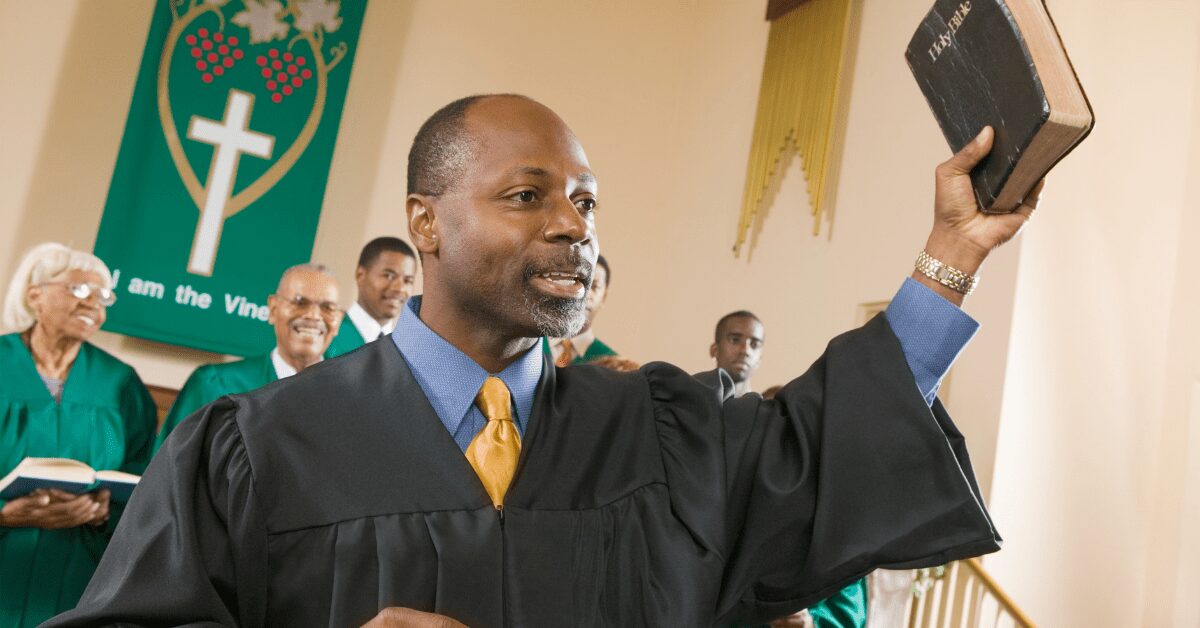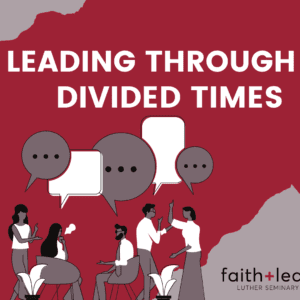“Our world is changing, the Church has to change too.” Surely this is an overly simple statement, and yet most of us know it is true. We are living in the days of the “Covidian Era”(1), a “post-Christendom” world (2); and the list of new titles for our current realities and experiences grows almost every day. So, how do we, as the Church and church leaders, respond to the ever-intensifying fear, angst, and disillusionment of a rapidly changing and hurting world?
How do we lead when our parishes are so divided? Political, cultural, or a deep-seated fear of loss, division, cut-off, and detachment seem to be the most prolific routes that are chosen in challenging situations. It may seem an easier route, but is this division what we’re called to do? Certainly, there is a place for boundaries and safe distance when circumstances are harmful. But as the Body of Christ, where baptismal grace urges us to embody the Fruit of the Spirit (Galatians 5:22-23)—love, joy, peace, patience, kindness, generosity, faithfulness, gentleness, and self-control—at all times, even in difficult situations, there must be an alternative route of leadership that embodies the way of Jesus Christ.
As a 12-year veteran at the judicatory level of ministry in the Evangelical Lutheran Church in America (ELCA), I, my bishop, and the rest of the Northwestern Ohio Synod (NWOS) staff are continually struck by the time-consuming nature of conflict in our parishes. Whether it is with individuals, teams or a whole worshipping community, troubles untended not only linger but grow and magnify disproportionally as discontent, anger, divisions, and misunderstanding or disagreements fester.
COVID-19 and its aftermath certainly gave the NWOS staff the opportunity to either enhance conflict and division as it challenged every connection, practice, protocol, management style, leadership style, and process that we knew. Or it gave us the opportunity to take time to look around, to reflect, think, and learn something new. We have found 2020–2021 to be a critical time of reimagining how to be aligned with God’s will; God’s will for us individually and corporately. God has not called us to be in the conflict business exclusively. Rather, God has given us a mission: Sent by the crucified and risen Jesus to Make Disciples, Equip Leaders, Strengthen Parishes, and Nurture New Communities for the renewal of Northwestern Ohio and the World.
If this is true, then the Fruit of the Spirit, strong relationships and deep connections are values through which we are called to live and to lead. For us, these months have gifted us with an inspiring rhythm of meeting, dreaming and prayer that has sustained us and given us the opportunity to grow in relationship, connection, resilience, understanding compassion, courage and hope both individually and as a team. And now we are developing plans, tools and teams to multiply this “relational model” throughout our synod with our pastors, deacons, and lay leaders, particularly those new to the synod.
Choices, commitment and course correction critical for change
If nothing else, the last 20 months has shown us that relationships, open communication, and connection make all the difference in how ministries develop and evolve over time.
Our commitment is to share these values throughout the synod because:
- They embody what we’re called to do and to be in Christ
- They cultivate healthier leaders and ministries and
- They can help us address difficulties and conflict more directly and appropriately if it arises.
We’ve determined that a cultural shift towards these values is most effective by engaging leaders and parishes at the very beginning of their new ministry. Thus, we are implementing a Starting Strong Phase in our Call Process that commences as soon as an official parish Call has been established. We anticipate this early engagement will realize a ministry paradigm shift towards open discernment, communication, and effective conflict resolution. As such, we have begun to see and look forward to a significant reduction in crisis and conflict situations, as well as an increased focus on the mission of Christ to which we are called; a mission to be church to those without a spiritual community or connection, and the development of communities of love and forgiveness, acceptance, and grace.
This is not a small task, and we are building teams to assist the work that cannot be accomplished by 4 full-time and 6 part-time staff for 160 parishes in 23 counties of NW Ohio. Our Starting Strong Teams are critical in building connections and healthy ministries. Here’s the plan:
Goal: To grow the Kingdom of God and nurture NW Ohio leaders, ministries and parishes through the values of curiosity, courage, compassion, connection, and community laced with the Fruit of the Spirit, hope and love which permeate every conversation, activity and relationship.
Objective: To assist new ministries to begin strongly and to grow, enhance and establish thriving ministries through regular, steady and sustained communication among the Starting Strong Team, new pastors, deacons, and other pastoral and parish leaders.
Timeframe: The first 24 months of a new ministry are critical. The Starting Strong Phase commences at the time of an official call to invite a leader to service. The Starting Strong Team is in place immediately to build a community around the new leader and parish leaders, and for 24 months supports the growth of ministry in that place.
Starting strong process
Once the call is affirmed and accepted, the Synod Bishop makes the first welcome call to a new pastoral leader. From there a formal installation and routine communication plan is established with the Starting Strong Team: Conference Deans, Synod Council members, various Synod Staff members and a designated Conference Companion. This team’s primary job is to support and nurture relationships through a designated communication plan that utilizes almost quarterly touch points over a 24-month period. The Starting Strong phase culminates in an official parish team and ministry review that celebrates strengthened relationships, robust ministries, and compelling mission.
Communication in the Starting Strong phase varies from informal phone check-ins to official conversations which incorporate participation by parish leadership teams. Questions and dialogue incorporated in this relational model of leadership development are designed for genuine curiosity and authentic community, and focus on joys, dreams, skill development, and NWOS’s 12 C’s of Leadership (C = characteristics). They also assist in identifying potential pitfalls and challenges. Some contacts are individualistic and focus on personal pastoral leadership and relationship development, while others are more focused on team conversations that build upon each other as time progresses. If situations of tension arise, the flow of contact, personnel, and intervention is modified to respond to the level of need.
The courage to connect in new ways through this sustained early investment provides space for listening, learning together, and immediately tending to misunderstandings or miscommunication, especially issues that might grow into something bigger. It also allows us to discern together next steps, appropriate and necessary responses, as well as to celebrate the joys of growing in ministry together.
What a delight to do this work positively and passionately at the beginning of ministry rather than in frustration and angst as things deteriorate, or at the end of a ministry when things have gone too far to be corrected or healed.
A call for curiosity, courage, and community
The last 20+ months have challenged us individually and corporately above and beyond anything we’ve experienced in our lifetime thus far. Leading in difficult times, especially those characterized by division and angst, is never easy.
And yet, the God we serve is a God of hope and love, a God who gives us a mission and a vision beyond any limiting experience we endure here on earth, a God incarnate, a God of community.
Living in God’s baptismal grace, God calls us to move forward to be the people and Church God longs for us to be. God calls us to courageous connection.
Your turn
- What is vexing you right now or challenging you to think a little differently?
- Are you taking the time to tinker? Are you taking the time to gain some new perspective?
- How might you utilize the values of curiosity, courage and community in your life and ministry?
- What processes can you put into place that allow for new connections, honest, open communication and relationship-building that is characterized by the Fruit of the Spirit, hope, and love even in the midst of disagreements?
- What are you doing to move into a mission (beyond Covid management) that nurtures thriving ministries and loving communities?
Pray with me:
Awesome and living God, Spirit of life and grace, you have gifted us with skills of leadership, a mission of service and a vision of unity in the mystery of your love and holiness; we praise you. You have given us the ability to be curious, to be courageous and to build relationships, community, and connection with each other, and with others we don’t even know yet; we thank you. Bless our divisions and disagreements with forgiveness and mercy, hope and love. Teach us how to be the people you long for us to be. We pray this now in the strong and steady name of Jesus. Amen
________
Learn More
The 12 C’s of Leadership (access here)
Notes:
- “Covidian Era” (Beck, Michael Adam, Ministry Matters™ | Never waste a reset: How churches can thrive in 2021
- “Post-Christendom” world (Murray, Stuart, “Church After Christendom”)
Definitions:
ELCA – Evangelical Lutheran Church in America is a denomination of 8,900 congregations across the United States, Puerto Rico and the U.S. Virgin Islands. The ELCA is a church that “shares a living, daring confidence in God’s grace. This faith comes through the good news of Jesus Christ and gives us the freedom and the courage to wonder, discover and boldly participate in what God is up to in the world.”
Synod – The word “synod” means ‘on the journey together,’ and regional groupings of congregations are known as synods. The ELCA has 65 Synods, which unite the work of the people and congregations within each area, serve as regional support, and guide pastoral and other staff candidates.
Northwestern Ohio Synod – The parishes of the Northwestern Ohio Synod are comprised of 68,000 members from all walks of life and life experiences who make up the 160 parishes in the 23 counties of NW Ohio.
Bishop – Each Synod is led by an elected Bishop. Bishops provide pastoral leadership to pastors, deacons, parishes and ministries, as well as oversee the administration of the synod and its staff.
Synod Council – The Northwestern Ohio Synod Council is the board of directors of the synod and serves as its interim legislative authority between meetings of the synod assembly.
Conference Dean – The Northwestern Ohio Synod has 7 Conferences which are smaller regional hubs of parishes, and the Dean is a local parish pastor who assists the Bishop and staff in ministry and administrative oversight.
Conference Companion – This newly developing position is an identified leader in each conference who serves as a mentor and guide to new pastoral leaders in the Northwestern Oho Synod.




